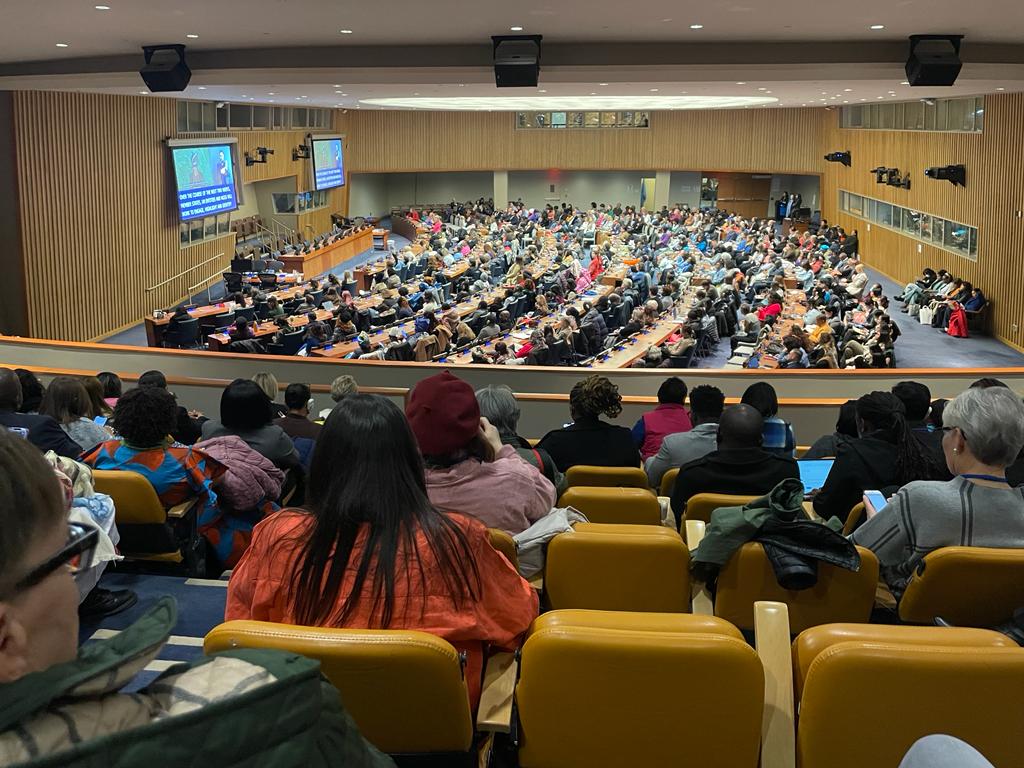Our Organized Constituency's Formal Statements to the CSW67 General Discussion

In week two of the 67th Session of the Commission on the Status of Women (CSW67), the local and regional government constituency continued to amplify their voices, in particular, through in-person inputs in the General Discussion and the Interactive Dialogues. This follows a successful first week, where a delegation of local governments, led by UCLG Co-president and Chair of the Standing Committee on Gender Equality, Fatimetou Abdel Malick, participated in a number of sessions, including two co-organized parallel events, and the Local and Regional Governments’ Day.
On Monday March 13th, Tania Verge Mestre, Minister of Equality and Feminism of the Generalitat de Catalunya, represented the local government constituency in the Interactive Dialogue with Youth Representatives on the Priority theme. The Minister shared: “There can be no global feminist agenda without strong local and regional feminist agendas. Local governments’ role is, crucially, in promoting the meaningful participation of women and youth, in their full diversity in policy making so that their experiences, needs and aspirations are included. Making efforts to close the digital divide, creating safe public spaces for women, responding to violence against women, including digital violence, with specialized care services both onsite and online and with community based preventative measures are all key local areas of action… The feminist transformation, we believe, must be trans-inclusive and anti-racist. Without equality there is no individual, nor collective freedom. This is the motive that drives for feminist transformation. We local and regional governments call the global community to pursue radical change, a feminist transformation”.
The local government constituency’s Statement in the CSW General Discussion took place on Wednesday March 15th in the UN General Assembly Hall, presented by Sri Sofjan from the Huairou Commission, a long-standing partner of UCLG, which leads the Feminism Caucus of the Town Halls. Counting on a grassroots partner to share the Statement aims to reaffirm that strong partnerships between local authorities and communities are essential to ensure feminist policies can be realized, and rooted in communities. The Statement drew from the constituency’s Written Statement to the CSW67, which is summarized below:
Feminist politics means putting care for people and planet at the center, and ensuring people of all genders, in all their diversity, can thrive. It places emphasis on ensuring equity for historically and systemically marginalized groups, including women, girls and LGBTQIA+ communities, people of color, older persons, persons with disabilities, indigenous groups, and migrants. It challenges gender norms and cultures which limit or harm peoples’ ability to be truly human, to engage with their emotions, to connect with one another. It is anti-racist, anti-sexist, anti-xenophobic, anti-ablest.
While ICTs allow many to sustain their livelihoods and education in times of disruption, this is marked by deepened inequalities, rooted in systemic discrimination, and presents new threats to privacy, online gender-based violence and discrimination. Local governments play a key role in addressing this and are working hard to implement user-centered principles for the delivery of digital public services which account for a diversity of needs, by, for example facilitating access to technology and learning opportunities, running participatory design processes, using gender-sensitive data-collection approaches, adopting inclusive public procurement, and increasing accessibility of online services.
The Global Feminist Municipal Movement will continue to address systemic inequalities and ensure no one and no place is left behind, both online and offline. As such, the constituency of local and regional governments, with a diversity of agendas and priorities, rooted in local knowledge and community needs, call for a new way of doing politics and applying and regulating technology, and:
● EMPHASIZE the transformative role of the Global Feminist Municipal Movement, to conceive equitably empowered women, feminist and LGBTQIA+ leaders as an integral in our work to address challenges around wellbeing, deep-rooted structural inequalities, climate injustice, or fundamental human rights, including digital rights. ● AGREE that women, girls & diverse groups’ experiences, voices, participation and leadership are fundamental to bridge the digital divide, with particular attention to the inequalities between Global North and South.
● DENOUNCE all forms of gender-based violence, discrimination, backlash & disinformation in the online sphere, particularly targeted at women leaders and activists, which threatens their capacity to engage in politics and undermines the foundations of a democratic society. ● COMMIT to implementing user-centered principles & universal design, for the development and delivery of digital public services and deem “digital first” an important principle that allows local government to prioritize contact with residents.
● CONSIDER that digitalization can transform how citizens interact with local government but that processes must be co-designed with communities, women & gender diverse groups, to ensure needs are directly addressed using an intersectional and gender-sensitive lens.
● GUARANTEE that technology does not, in and of itself, define the way forward and that all policy makers from all spheres of government need to guide it and ensure it enhances democracy, participatory policy making and open government. Furthermore, recognise that information and communications technologies also have negative social and ecological impacts which must be navigated and mitigated.
● APPEAL to the global community to embrace a feminist politics of care, in order to enable all life to thrive.
Wrapping up an important two weeks of engagements during the 2023 CSW67, we are only more convinced of the critical role of the Feminist Municipal Movement in localizing inclusive and equitable technological access and ensuring digital rights for all. In concluding, we local and regional governments appeals to the global community to pursue the radical transformation of our gendered systems, and to embrace a feminist politics of care, in order to enable all to thrive.
A full copy of the Written Statement can be found here. You can learn more about the Local and Regional Governments’ Day and Parallel Sessions here.
